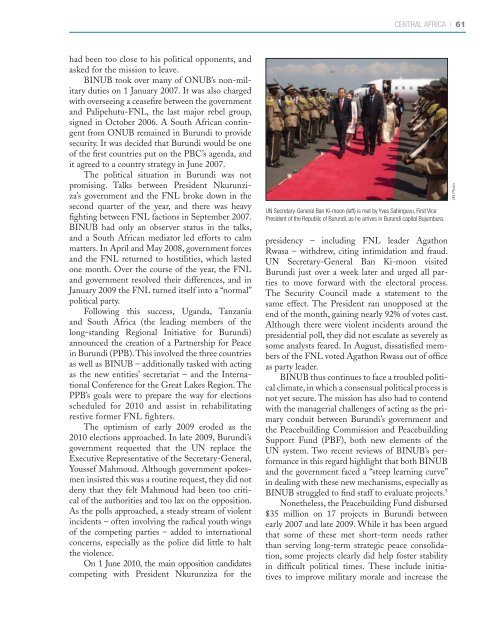here - Center on International Cooperation - New York University
here - Center on International Cooperation - New York University
here - Center on International Cooperation - New York University
Create successful ePaper yourself
Turn your PDF publications into a flip-book with our unique Google optimized e-Paper software.
Central Africa | 61had been too close to his political opp<strong>on</strong>ents, andasked for the missi<strong>on</strong> to leave.BINUB took over many of ONUB’s n<strong>on</strong>-militaryduties <strong>on</strong> 1 January 2007. It was also chargedwith overseeing a ceasefire between the governmentand Palipehutu-FNL, the last major rebel group,signed in October 2006. A South African c<strong>on</strong>tingentfrom ONUB remained in Burundi to providesecurity. It was decided that Burundi would be <strong>on</strong>eof the first countries put <strong>on</strong> the PBC’s agenda, andit agreed to a country strategy in June 2007.The political situati<strong>on</strong> in Burundi was notpromising. Talks between President Nkurunziza’sgovernment and the FNL broke down in thesec<strong>on</strong>d quarter of the year, and t<str<strong>on</strong>g>here</str<strong>on</strong>g> was heavyfighting between FNL facti<strong>on</strong>s in September 2007.BINUB had <strong>on</strong>ly an observer status in the talks,and a South African mediator led efforts to calmmatters. In April and May 2008, government forcesand the FNL returned to hostilities, which lasted<strong>on</strong>e m<strong>on</strong>th. Over the course of the year, the FNLand government resolved their differences, and inJanuary 2009 the FNL turned itself into a “normal”political party.Following this success, Uganda, Tanzaniaand South Africa (the leading members of thel<strong>on</strong>g-standing Regi<strong>on</strong>al Initiative for Burundi)announced the creati<strong>on</strong> of a Partnership for Peacein Burundi (PPB). This involved the three countriesas well as BINUB – additi<strong>on</strong>ally tasked with actingas the new entities’ secretariat – and the Internati<strong>on</strong>alC<strong>on</strong>ference for the Great Lakes Regi<strong>on</strong>. ThePPB’s goals were to prepare the way for electi<strong>on</strong>sscheduled for 2010 and assist in rehabilitatingrestive former FNL fighters.The optimism of early 2009 eroded as the2010 electi<strong>on</strong>s approached. In late 2009, Burundi’sgovernment requested that the UN replace theExecutive Representative of the Secretary-General,Youssef Mahmoud. Although government spokesmeninsisted this was a routine request, they did notdeny that they felt Mahmoud had been too criticalof the authorities and too lax <strong>on</strong> the oppositi<strong>on</strong>.As the polls approached, a steady stream of violentincidents – often involving the radical youth wingsof the competing parties – added to internati<strong>on</strong>alc<strong>on</strong>cerns, especially as the police did little to haltthe violence.On 1 June 2010, the main oppositi<strong>on</strong> candidatescompeting with President Nkurunziza for theUN Secretary-General Ban Ki-mo<strong>on</strong> (left) is met by Yves Sahinguvu, First VicePresident of the Republic of Burundi, as he arrives in Burundi capital Bujumbura.presidency – including FNL leader Agath<strong>on</strong>Rwasa – withdrew, citing intimidati<strong>on</strong> and fraud.UN Secretary-General Ban Ki-mo<strong>on</strong> visitedBurundi just over a week later and urged all partiesto move forward with the electoral process.The Security Council made a statement to thesame effect. The President ran unopposed at theend of the m<strong>on</strong>th, gaining nearly 92% of votes cast.Although t<str<strong>on</strong>g>here</str<strong>on</strong>g> were violent incidents around thepresidential poll, they did not escalate as severely assome analysts feared. In August, dissatisfied membersof the FNL voted Agath<strong>on</strong> Rwasa out of officeas party leader.BINUB thus c<strong>on</strong>tinues to face a troubled politicalclimate, in which a c<strong>on</strong>sensual political process isnot yet secure. The missi<strong>on</strong> has also had to c<strong>on</strong>tendwith the managerial challenges of acting as the primaryc<strong>on</strong>duit between Burundi’s government andthe Peacebuilding Commissi<strong>on</strong> and PeacebuildingSupport Fund (PBF), both new elements of theUN system. Two recent reviews of BINUB’s performancein this regard highlight that both BINUBand the government faced a “steep learning curve”in dealing with these new mechanisms, especially asBINUB struggled to find staff to evaluate projects. 5N<strong>on</strong>etheless, the Peacebuilding Fund disbursed$35 milli<strong>on</strong> <strong>on</strong> 17 projects in Burundi betweenearly 2007 and late 2009. While it has been arguedthat some of these met short-term needs ratherthan serving l<strong>on</strong>g-term strategic peace c<strong>on</strong>solidati<strong>on</strong>,some projects clearly did help foster stabilityin difficult political times. These include initiativesto improve military morale and increase theUN Photo
















